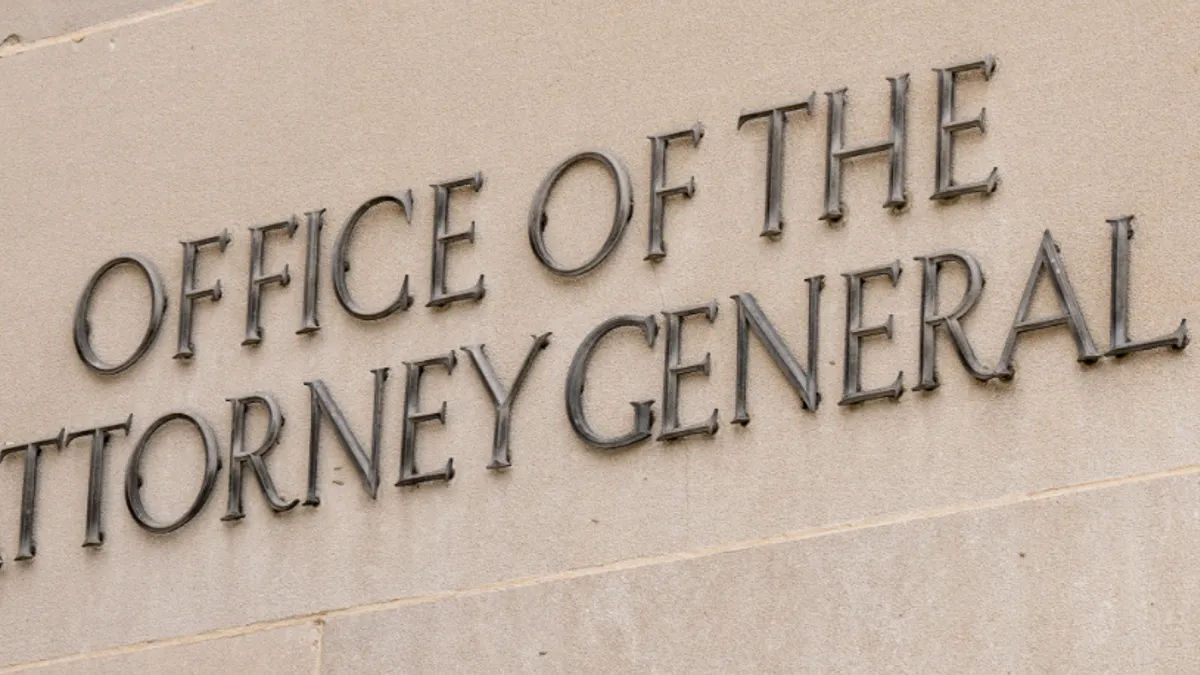Companies in the crosshairs of a state attorney general action won’t get much sympathy complaining about the cost of a settlement, but if they show a willingness to make operational changes that would model improvement for the wider industry, AGs could be receptive to lowering penalties, former state prosecutors say.
“AGs are willing to listen,” Milton Marquis, a Cozen O’Connor attorney who worked in state AG offices in Massachusetts and Virginia, said in a Cozen O’Connor podcast. “Sometimes you have to put your business people on a Zoom call to explain your business and why what may appear on the surface to be an easy fix is not so easy. But you have to provide alternatives. It just can’t be, ‘No, no, no, no. We can’t do this. It’s too hard.’”
“It’s all in the framing,” said Meghan Stoppel, a Cozen attorney who served in the Kansas AG’s office and as Nebraska consumer protection chief. “If you say to the enforcer, ‘We’re willing to do it, and by doing so we think we’re bringing along the industry or we have the potential to bring along the industry for reasons X, Y, and Z’ or it’s something that the law otherwise doesn’t require … that’s going to resonate.”
What won’t work is trying to frame the operational change you need to make as something more than it is.
“If [it’s] something the business needs to be doing internally to remain in compliance with the law, you’re not going to get a lot of sympathy from the enforcer when you come to them and say, ‘It’s expensive,’” Stoppel said.
Civil penalties
In-house counsel will likely have the most flexibility in negotiating civil penalty amounts, if there are any, rather than restitution or disgorgement amounts, said the attorneys, who serve as defense counsel to companies dealing with a state AG action.
State AGs’ priority is getting into the hands of consumers any money they lost, so don’t expect much give on the restitution amount. Same thing with disgorgement of any ill-gotten profits.
These amounts tie directly to the harm that was caused and at the same time some of that money can go into the AG’s coffers to help it recoup its investigation costs and also help pay for operations.
“That money is usually put in some sort of fund or account that the AG then can use to fund their office, to keep those complaint mediation units functioning, to bring other investigations and enforcement actions,” Stoppel said.
Civil penalties are more negotiable because part of their purpose is symbolic.
Companies “don’t want something labeled as a civil penalty … for a variety of reasons,” said Stoppel. “So, there’s often a lot of negotiation about that and that is actually something that enforcers are willing to give up.”
State AGs typically see their role as two-fold. On the one hand, they’re primarily enforcers of statute, so if a company violates a law, they’re taking action in response to that. On the other hand, under certain circumstances, they’re using their enforcement action to bring about broader change, not unlike a regulator.
The opioid crisis is a case in point. State AGs brought cases against pharmaceutical companies, but they brought into negotiations distributors and others as a way to close the regulatory gaps that led to the crisis in the first place.
“Discussions … started years ago as somewhat narrow and then very rapidly expanded to include all sorts of other parties – distributors, retail pharmacies [and] local municipalities,” said Stoppel. “You saw that conversation very quickly evolve from, ‘This is an opportunity to enforce the law,’ to, ‘This is an opportunity to effect change.’ The AGs were essentially saying there was a social ill here that needs to be addressed and we’re going to use our law enforcement authority to address it.”
“There was a perceived failure of other agencies and entities to address a problem,” said Marquis. “That’s what’s driving the increase in [penalty amounts] and state legislators increasing the penalties, [giving] AGs an additional tool in their toolboxes to address these issues.”
Bottom line, for in-house counsel whose company is in enforcement crosshairs, don’t be dismissive of what the AG’s office proposes if it appears unrealistic.
Instead, walk the staff attorneys through the operational changes that could meet their demands and, where it applies, help shift how the industry more broadly conducts business. Then use that as a starting point for negotiating what would constitute a reasonable civil penalty, if any is sought.
“The takeaway … is engage early, engage often, and try to come up with a resolution that oftentimes can be creative, but that really goes to the heart of the concerns,” said Marquis.



















